Emotional Intelligence: Factors, Teaching, and Determination
VerifiedAdded on 2023/03/20
|13
|3201
|81
Essay
AI Summary
This essay delves into the multifaceted concept of emotional intelligence (EI), emphasizing its crucial role in workplace environments and leadership effectiveness. It explores key factors such as self-assessment, self-regulation, empathy, relationship management, and effective communication, highlighting their impact on fostering strong alliances and achieving organizational success. The essay further examines the teachability of EI, providing strategies and methods for enhancing emotional capabilities, including educating team members, encouraging social responsibility, and emphasizing the importance of self-assessment and continuous learning. The essay also details how to determine EI through recognizing key behaviors and characteristics, offering insights into how to identify individuals with high emotional intelligence and their potential for contributing to organizational success.
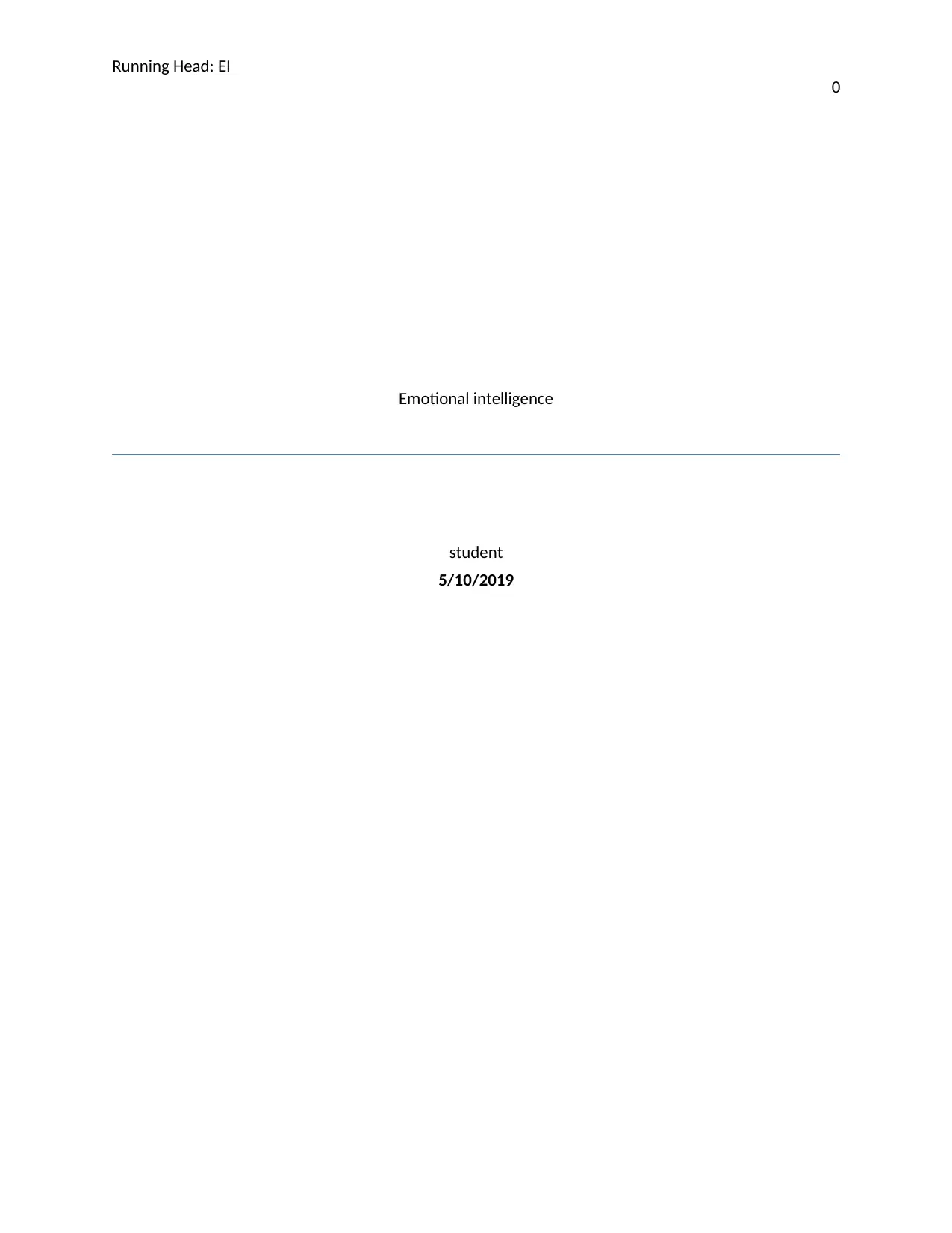
Running Head: EI
0
Emotional intelligence
student
5/10/2019
0
Emotional intelligence
student
5/10/2019
Paraphrase This Document
Need a fresh take? Get an instant paraphrase of this document with our AI Paraphraser
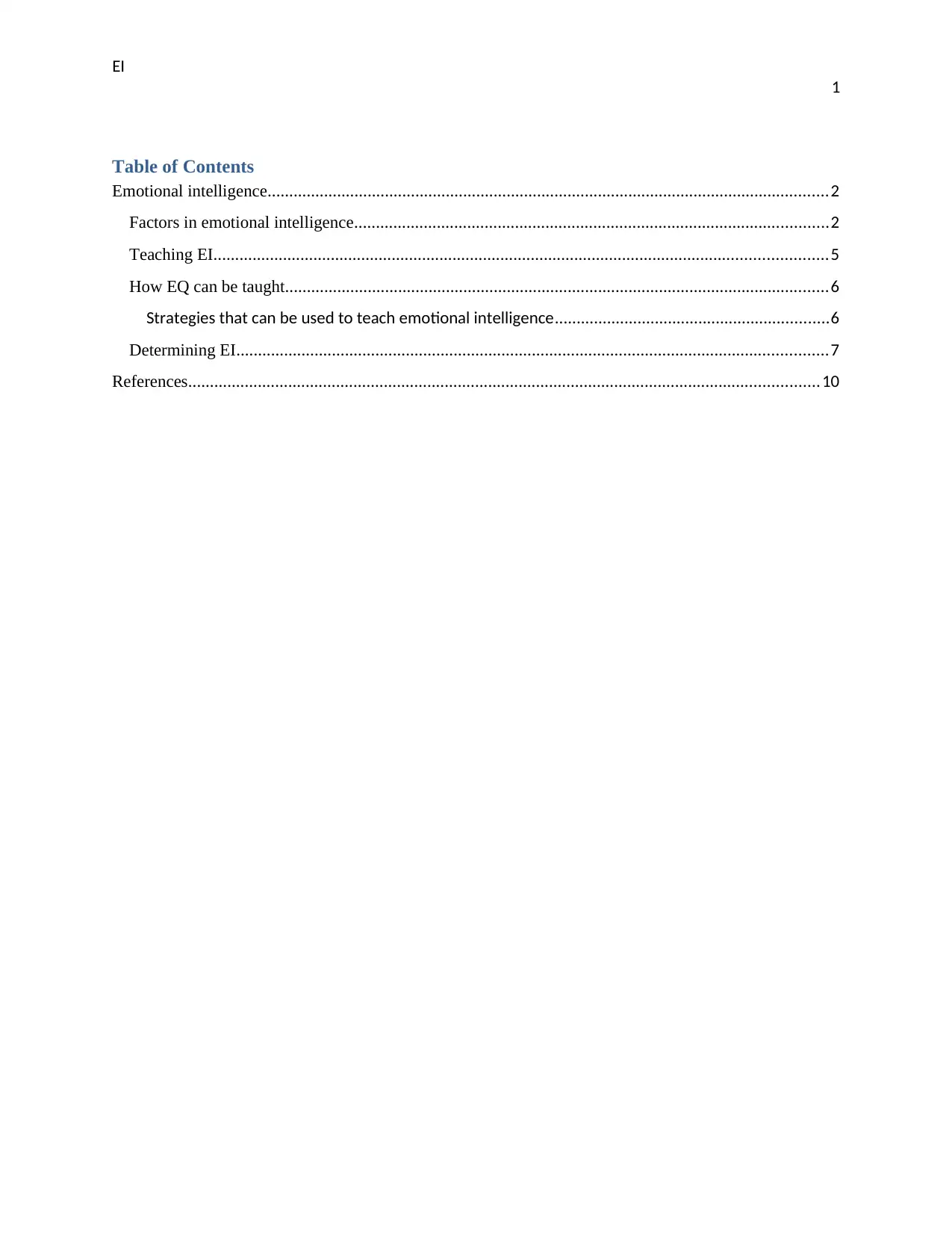
EI
1
Table of Contents
Emotional intelligence.................................................................................................................................2
Factors in emotional intelligence.............................................................................................................2
Teaching EI.............................................................................................................................................5
How EQ can be taught.............................................................................................................................6
Strategies that can be used to teach emotional intelligence...............................................................6
Determining EI........................................................................................................................................7
References.................................................................................................................................................10
1
Table of Contents
Emotional intelligence.................................................................................................................................2
Factors in emotional intelligence.............................................................................................................2
Teaching EI.............................................................................................................................................5
How EQ can be taught.............................................................................................................................6
Strategies that can be used to teach emotional intelligence...............................................................6
Determining EI........................................................................................................................................7
References.................................................................................................................................................10
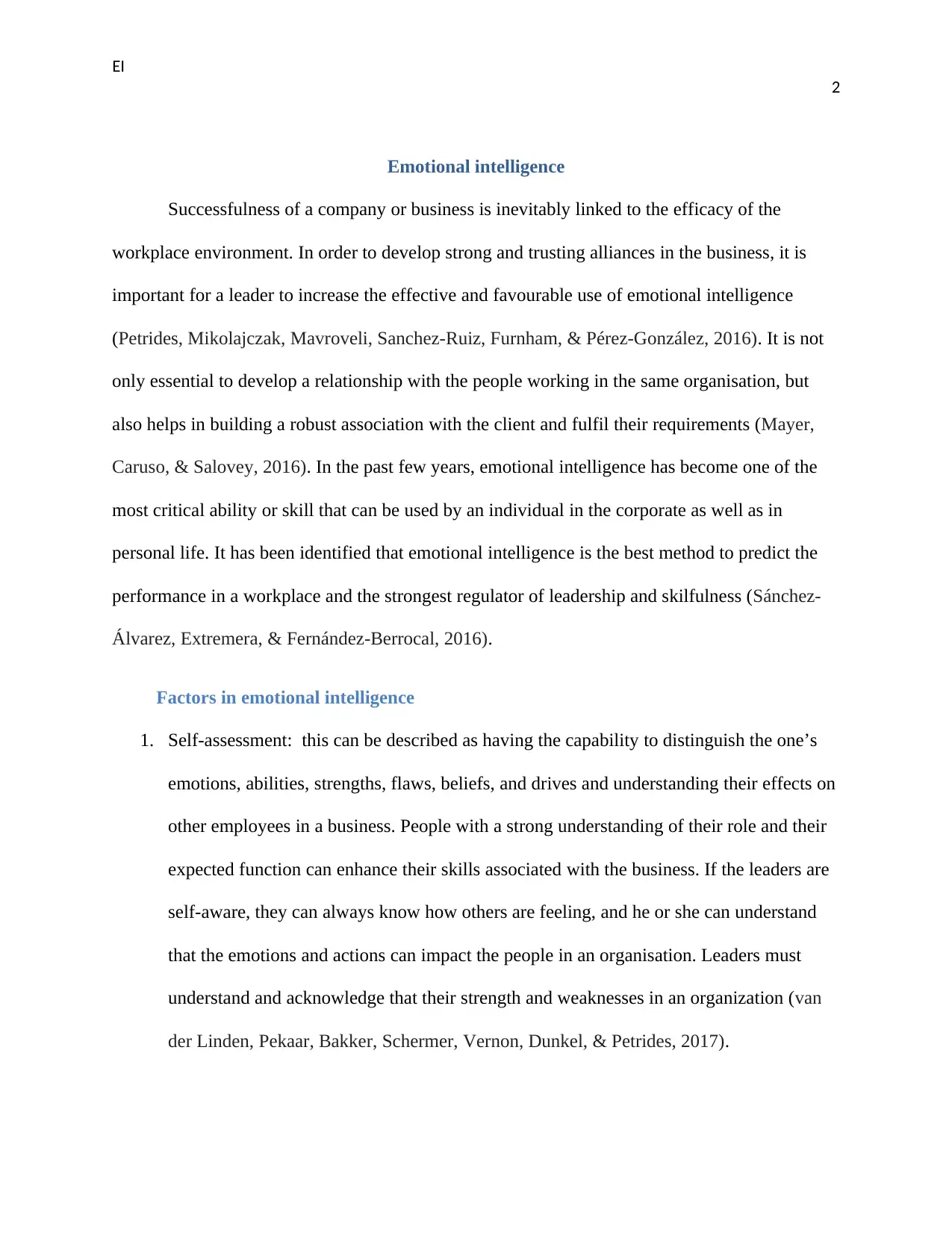
EI
2
Emotional intelligence
Successfulness of a company or business is inevitably linked to the efficacy of the
workplace environment. In order to develop strong and trusting alliances in the business, it is
important for a leader to increase the effective and favourable use of emotional intelligence
(Petrides, Mikolajczak, Mavroveli, Sanchez-Ruiz, Furnham, & Pérez-González, 2016). It is not
only essential to develop a relationship with the people working in the same organisation, but
also helps in building a robust association with the client and fulfil their requirements (Mayer,
Caruso, & Salovey, 2016). In the past few years, emotional intelligence has become one of the
most critical ability or skill that can be used by an individual in the corporate as well as in
personal life. It has been identified that emotional intelligence is the best method to predict the
performance in a workplace and the strongest regulator of leadership and skilfulness (Sánchez-
Álvarez, Extremera, & Fernández-Berrocal, 2016).
Factors in emotional intelligence
1. Self-assessment: this can be described as having the capability to distinguish the one’s
emotions, abilities, strengths, flaws, beliefs, and drives and understanding their effects on
other employees in a business. People with a strong understanding of their role and their
expected function can enhance their skills associated with the business. If the leaders are
self-aware, they can always know how others are feeling, and he or she can understand
that the emotions and actions can impact the people in an organisation. Leaders must
understand and acknowledge that their strength and weaknesses in an organization (van
der Linden, Pekaar, Bakker, Schermer, Vernon, Dunkel, & Petrides, 2017).
2
Emotional intelligence
Successfulness of a company or business is inevitably linked to the efficacy of the
workplace environment. In order to develop strong and trusting alliances in the business, it is
important for a leader to increase the effective and favourable use of emotional intelligence
(Petrides, Mikolajczak, Mavroveli, Sanchez-Ruiz, Furnham, & Pérez-González, 2016). It is not
only essential to develop a relationship with the people working in the same organisation, but
also helps in building a robust association with the client and fulfil their requirements (Mayer,
Caruso, & Salovey, 2016). In the past few years, emotional intelligence has become one of the
most critical ability or skill that can be used by an individual in the corporate as well as in
personal life. It has been identified that emotional intelligence is the best method to predict the
performance in a workplace and the strongest regulator of leadership and skilfulness (Sánchez-
Álvarez, Extremera, & Fernández-Berrocal, 2016).
Factors in emotional intelligence
1. Self-assessment: this can be described as having the capability to distinguish the one’s
emotions, abilities, strengths, flaws, beliefs, and drives and understanding their effects on
other employees in a business. People with a strong understanding of their role and their
expected function can enhance their skills associated with the business. If the leaders are
self-aware, they can always know how others are feeling, and he or she can understand
that the emotions and actions can impact the people in an organisation. Leaders must
understand and acknowledge that their strength and weaknesses in an organization (van
der Linden, Pekaar, Bakker, Schermer, Vernon, Dunkel, & Petrides, 2017).
⊘ This is a preview!⊘
Do you want full access?
Subscribe today to unlock all pages.

Trusted by 1+ million students worldwide
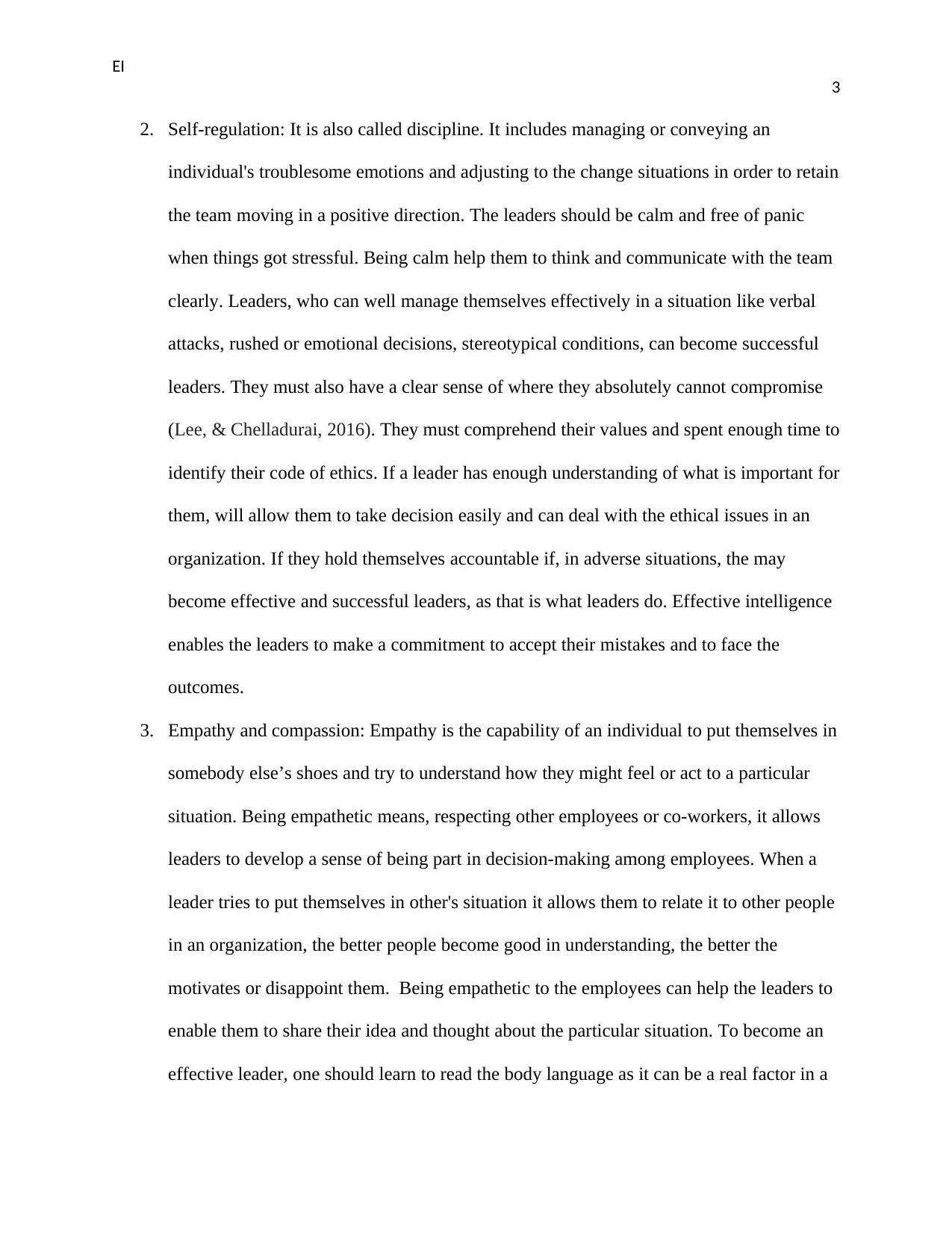
EI
3
2. Self-regulation: It is also called discipline. It includes managing or conveying an
individual's troublesome emotions and adjusting to the change situations in order to retain
the team moving in a positive direction. The leaders should be calm and free of panic
when things got stressful. Being calm help them to think and communicate with the team
clearly. Leaders, who can well manage themselves effectively in a situation like verbal
attacks, rushed or emotional decisions, stereotypical conditions, can become successful
leaders. They must also have a clear sense of where they absolutely cannot compromise
(Lee, & Chelladurai, 2016). They must comprehend their values and spent enough time to
identify their code of ethics. If a leader has enough understanding of what is important for
them, will allow them to take decision easily and can deal with the ethical issues in an
organization. If they hold themselves accountable if, in adverse situations, the may
become effective and successful leaders, as that is what leaders do. Effective intelligence
enables the leaders to make a commitment to accept their mistakes and to face the
outcomes.
3. Empathy and compassion: Empathy is the capability of an individual to put themselves in
somebody else’s shoes and try to understand how they might feel or act to a particular
situation. Being empathetic means, respecting other employees or co-workers, it allows
leaders to develop a sense of being part in decision-making among employees. When a
leader tries to put themselves in other's situation it allows them to relate it to other people
in an organization, the better people become good in understanding, the better the
motivates or disappoint them. Being empathetic to the employees can help the leaders to
enable them to share their idea and thought about the particular situation. To become an
effective leader, one should learn to read the body language as it can be a real factor in a
3
2. Self-regulation: It is also called discipline. It includes managing or conveying an
individual's troublesome emotions and adjusting to the change situations in order to retain
the team moving in a positive direction. The leaders should be calm and free of panic
when things got stressful. Being calm help them to think and communicate with the team
clearly. Leaders, who can well manage themselves effectively in a situation like verbal
attacks, rushed or emotional decisions, stereotypical conditions, can become successful
leaders. They must also have a clear sense of where they absolutely cannot compromise
(Lee, & Chelladurai, 2016). They must comprehend their values and spent enough time to
identify their code of ethics. If a leader has enough understanding of what is important for
them, will allow them to take decision easily and can deal with the ethical issues in an
organization. If they hold themselves accountable if, in adverse situations, the may
become effective and successful leaders, as that is what leaders do. Effective intelligence
enables the leaders to make a commitment to accept their mistakes and to face the
outcomes.
3. Empathy and compassion: Empathy is the capability of an individual to put themselves in
somebody else’s shoes and try to understand how they might feel or act to a particular
situation. Being empathetic means, respecting other employees or co-workers, it allows
leaders to develop a sense of being part in decision-making among employees. When a
leader tries to put themselves in other's situation it allows them to relate it to other people
in an organization, the better people become good in understanding, the better the
motivates or disappoint them. Being empathetic to the employees can help the leaders to
enable them to share their idea and thought about the particular situation. To become an
effective leader, one should learn to read the body language as it can be a real factor in a
Paraphrase This Document
Need a fresh take? Get an instant paraphrase of this document with our AI Paraphraser
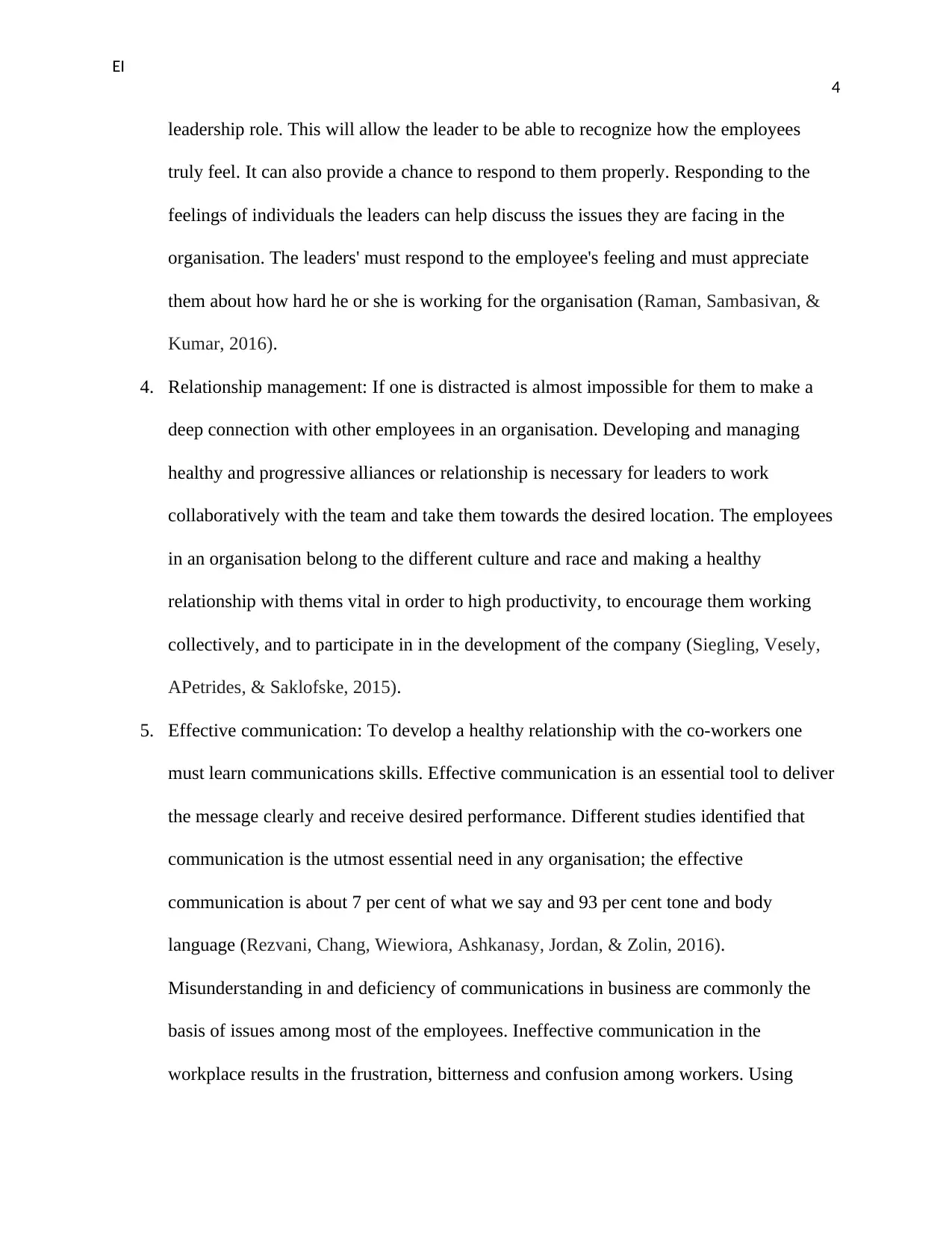
EI
4
leadership role. This will allow the leader to be able to recognize how the employees
truly feel. It can also provide a chance to respond to them properly. Responding to the
feelings of individuals the leaders can help discuss the issues they are facing in the
organisation. The leaders' must respond to the employee's feeling and must appreciate
them about how hard he or she is working for the organisation (Raman, Sambasivan, &
Kumar, 2016).
4. Relationship management: If one is distracted is almost impossible for them to make a
deep connection with other employees in an organisation. Developing and managing
healthy and progressive alliances or relationship is necessary for leaders to work
collaboratively with the team and take them towards the desired location. The employees
in an organisation belong to the different culture and race and making a healthy
relationship with thems vital in order to high productivity, to encourage them working
collectively, and to participate in in the development of the company (Siegling, Vesely,
APetrides, & Saklofske, 2015).
5. Effective communication: To develop a healthy relationship with the co-workers one
must learn communications skills. Effective communication is an essential tool to deliver
the message clearly and receive desired performance. Different studies identified that
communication is the utmost essential need in any organisation; the effective
communication is about 7 per cent of what we say and 93 per cent tone and body
language (Rezvani, Chang, Wiewiora, Ashkanasy, Jordan, & Zolin, 2016).
Misunderstanding in and deficiency of communications in business are commonly the
basis of issues among most of the employees. Ineffective communication in the
workplace results in the frustration, bitterness and confusion among workers. Using
4
leadership role. This will allow the leader to be able to recognize how the employees
truly feel. It can also provide a chance to respond to them properly. Responding to the
feelings of individuals the leaders can help discuss the issues they are facing in the
organisation. The leaders' must respond to the employee's feeling and must appreciate
them about how hard he or she is working for the organisation (Raman, Sambasivan, &
Kumar, 2016).
4. Relationship management: If one is distracted is almost impossible for them to make a
deep connection with other employees in an organisation. Developing and managing
healthy and progressive alliances or relationship is necessary for leaders to work
collaboratively with the team and take them towards the desired location. The employees
in an organisation belong to the different culture and race and making a healthy
relationship with thems vital in order to high productivity, to encourage them working
collectively, and to participate in in the development of the company (Siegling, Vesely,
APetrides, & Saklofske, 2015).
5. Effective communication: To develop a healthy relationship with the co-workers one
must learn communications skills. Effective communication is an essential tool to deliver
the message clearly and receive desired performance. Different studies identified that
communication is the utmost essential need in any organisation; the effective
communication is about 7 per cent of what we say and 93 per cent tone and body
language (Rezvani, Chang, Wiewiora, Ashkanasy, Jordan, & Zolin, 2016).
Misunderstanding in and deficiency of communications in business are commonly the
basis of issues among most of the employees. Ineffective communication in the
workplace results in the frustration, bitterness and confusion among workers. Using
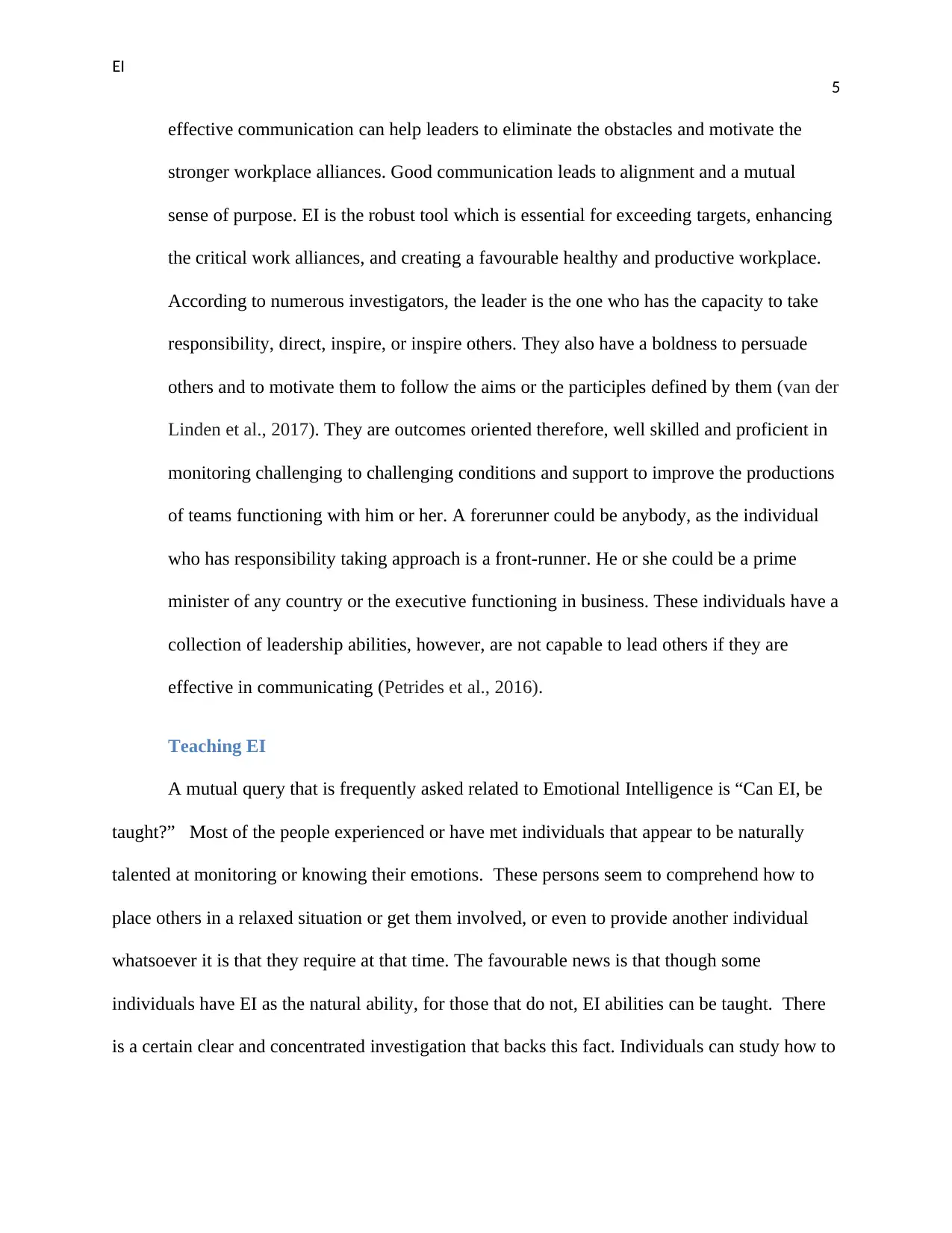
EI
5
effective communication can help leaders to eliminate the obstacles and motivate the
stronger workplace alliances. Good communication leads to alignment and a mutual
sense of purpose. EI is the robust tool which is essential for exceeding targets, enhancing
the critical work alliances, and creating a favourable healthy and productive workplace.
According to numerous investigators, the leader is the one who has the capacity to take
responsibility, direct, inspire, or inspire others. They also have a boldness to persuade
others and to motivate them to follow the aims or the participles defined by them (van der
Linden et al., 2017). They are outcomes oriented therefore, well skilled and proficient in
monitoring challenging to challenging conditions and support to improve the productions
of teams functioning with him or her. A forerunner could be anybody, as the individual
who has responsibility taking approach is a front-runner. He or she could be a prime
minister of any country or the executive functioning in business. These individuals have a
collection of leadership abilities, however, are not capable to lead others if they are
effective in communicating (Petrides et al., 2016).
Teaching EI
A mutual query that is frequently asked related to Emotional Intelligence is “Can EI, be
taught?” Most of the people experienced or have met individuals that appear to be naturally
talented at monitoring or knowing their emotions. These persons seem to comprehend how to
place others in a relaxed situation or get them involved, or even to provide another individual
whatsoever it is that they require at that time. The favourable news is that though some
individuals have EI as the natural ability, for those that do not, EI abilities can be taught. There
is a certain clear and concentrated investigation that backs this fact. Individuals can study how to
5
effective communication can help leaders to eliminate the obstacles and motivate the
stronger workplace alliances. Good communication leads to alignment and a mutual
sense of purpose. EI is the robust tool which is essential for exceeding targets, enhancing
the critical work alliances, and creating a favourable healthy and productive workplace.
According to numerous investigators, the leader is the one who has the capacity to take
responsibility, direct, inspire, or inspire others. They also have a boldness to persuade
others and to motivate them to follow the aims or the participles defined by them (van der
Linden et al., 2017). They are outcomes oriented therefore, well skilled and proficient in
monitoring challenging to challenging conditions and support to improve the productions
of teams functioning with him or her. A forerunner could be anybody, as the individual
who has responsibility taking approach is a front-runner. He or she could be a prime
minister of any country or the executive functioning in business. These individuals have a
collection of leadership abilities, however, are not capable to lead others if they are
effective in communicating (Petrides et al., 2016).
Teaching EI
A mutual query that is frequently asked related to Emotional Intelligence is “Can EI, be
taught?” Most of the people experienced or have met individuals that appear to be naturally
talented at monitoring or knowing their emotions. These persons seem to comprehend how to
place others in a relaxed situation or get them involved, or even to provide another individual
whatsoever it is that they require at that time. The favourable news is that though some
individuals have EI as the natural ability, for those that do not, EI abilities can be taught. There
is a certain clear and concentrated investigation that backs this fact. Individuals can study how to
⊘ This is a preview!⊘
Do you want full access?
Subscribe today to unlock all pages.

Trusted by 1+ million students worldwide
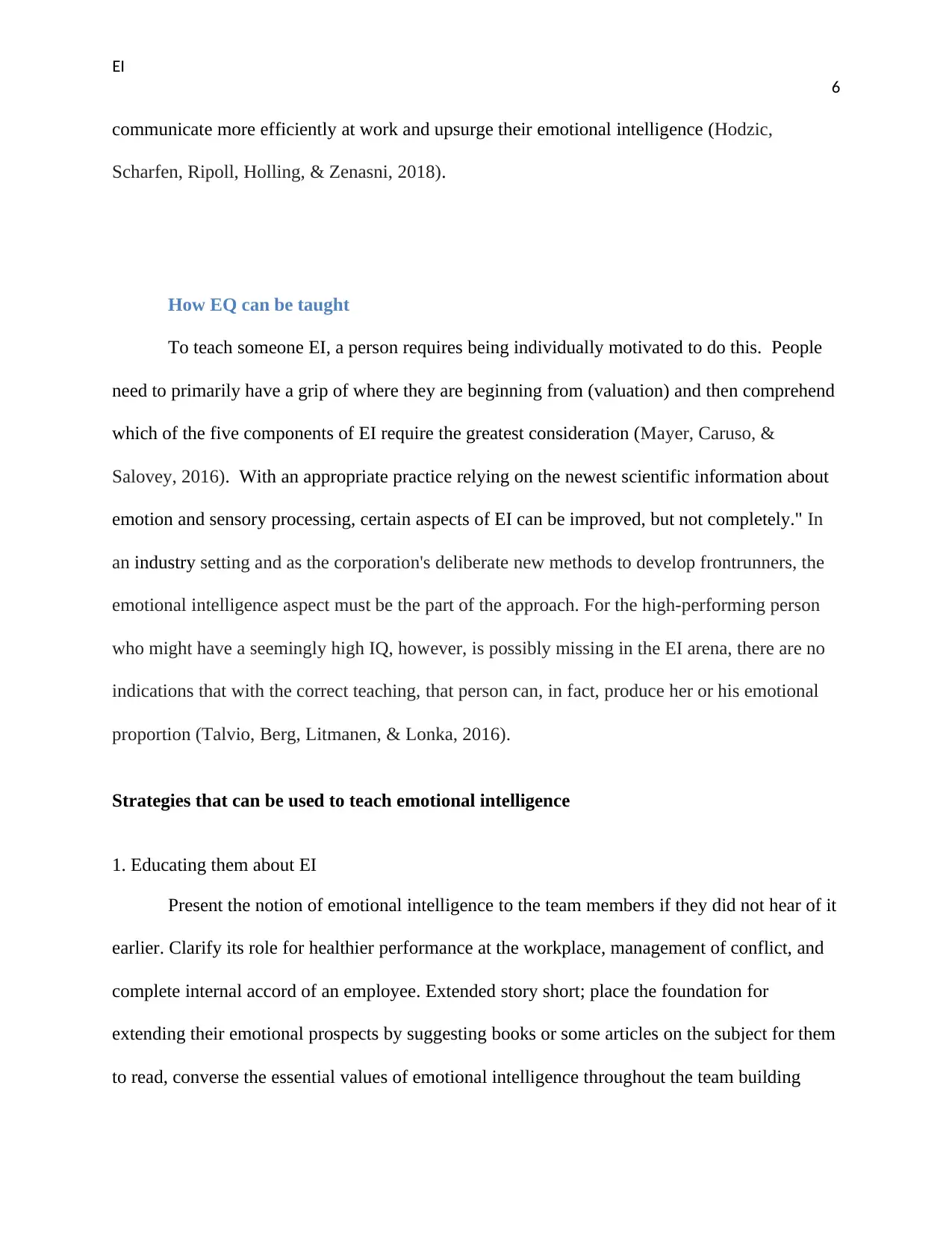
EI
6
communicate more efficiently at work and upsurge their emotional intelligence (Hodzic,
Scharfen, Ripoll, Holling, & Zenasni, 2018).
How EQ can be taught
To teach someone EI, a person requires being individually motivated to do this. People
need to primarily have a grip of where they are beginning from (valuation) and then comprehend
which of the five components of EI require the greatest consideration (Mayer, Caruso, &
Salovey, 2016). With an appropriate practice relying on the newest scientific information about
emotion and sensory processing, certain aspects of EI can be improved, but not completely." In
an industry setting and as the corporation's deliberate new methods to develop frontrunners, the
emotional intelligence aspect must be the part of the approach. For the high-performing person
who might have a seemingly high IQ, however, is possibly missing in the EI arena, there are no
indications that with the correct teaching, that person can, in fact, produce her or his emotional
proportion (Talvio, Berg, Litmanen, & Lonka, 2016).
Strategies that can be used to teach emotional intelligence
1. Educating them about EI
Present the notion of emotional intelligence to the team members if they did not hear of it
earlier. Clarify its role for healthier performance at the workplace, management of conflict, and
complete internal accord of an employee. Extended story short; place the foundation for
extending their emotional prospects by suggesting books or some articles on the subject for them
to read, converse the essential values of emotional intelligence throughout the team building
6
communicate more efficiently at work and upsurge their emotional intelligence (Hodzic,
Scharfen, Ripoll, Holling, & Zenasni, 2018).
How EQ can be taught
To teach someone EI, a person requires being individually motivated to do this. People
need to primarily have a grip of where they are beginning from (valuation) and then comprehend
which of the five components of EI require the greatest consideration (Mayer, Caruso, &
Salovey, 2016). With an appropriate practice relying on the newest scientific information about
emotion and sensory processing, certain aspects of EI can be improved, but not completely." In
an industry setting and as the corporation's deliberate new methods to develop frontrunners, the
emotional intelligence aspect must be the part of the approach. For the high-performing person
who might have a seemingly high IQ, however, is possibly missing in the EI arena, there are no
indications that with the correct teaching, that person can, in fact, produce her or his emotional
proportion (Talvio, Berg, Litmanen, & Lonka, 2016).
Strategies that can be used to teach emotional intelligence
1. Educating them about EI
Present the notion of emotional intelligence to the team members if they did not hear of it
earlier. Clarify its role for healthier performance at the workplace, management of conflict, and
complete internal accord of an employee. Extended story short; place the foundation for
extending their emotional prospects by suggesting books or some articles on the subject for them
to read, converse the essential values of emotional intelligence throughout the team building
Paraphrase This Document
Need a fresh take? Get an instant paraphrase of this document with our AI Paraphraser
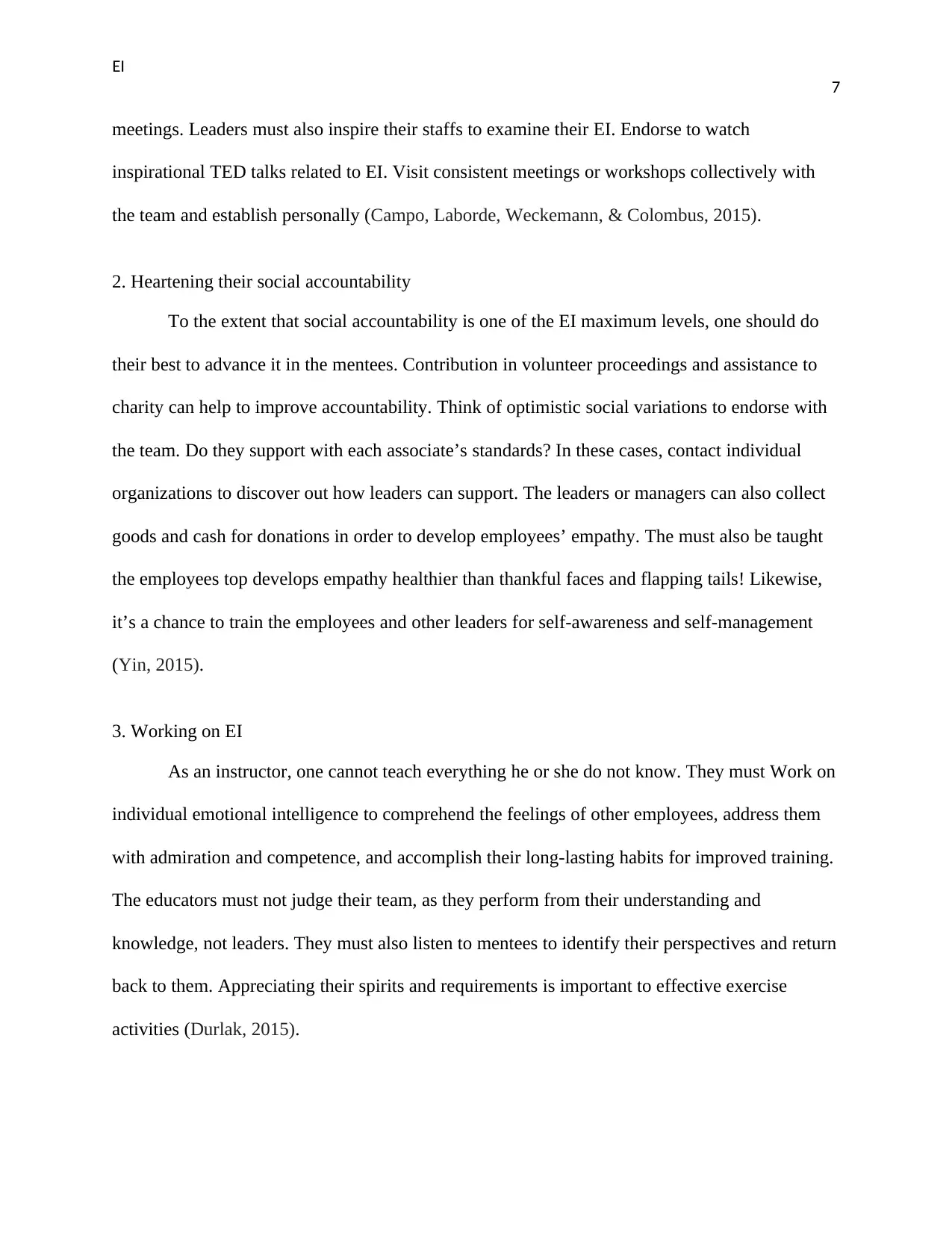
EI
7
meetings. Leaders must also inspire their staffs to examine their EI. Endorse to watch
inspirational TED talks related to EI. Visit consistent meetings or workshops collectively with
the team and establish personally (Campo, Laborde, Weckemann, & Colombus, 2015).
2. Heartening their social accountability
To the extent that social accountability is one of the EI maximum levels, one should do
their best to advance it in the mentees. Contribution in volunteer proceedings and assistance to
charity can help to improve accountability. Think of optimistic social variations to endorse with
the team. Do they support with each associate’s standards? In these cases, contact individual
organizations to discover out how leaders can support. The leaders or managers can also collect
goods and cash for donations in order to develop employees’ empathy. The must also be taught
the employees top develops empathy healthier than thankful faces and flapping tails! Likewise,
it’s a chance to train the employees and other leaders for self-awareness and self-management
(Yin, 2015).
3. Working on EI
As an instructor, one cannot teach everything he or she do not know. They must Work on
individual emotional intelligence to comprehend the feelings of other employees, address them
with admiration and competence, and accomplish their long-lasting habits for improved training.
The educators must not judge their team, as they perform from their understanding and
knowledge, not leaders. They must also listen to mentees to identify their perspectives and return
back to them. Appreciating their spirits and requirements is important to effective exercise
activities (Durlak, 2015).
7
meetings. Leaders must also inspire their staffs to examine their EI. Endorse to watch
inspirational TED talks related to EI. Visit consistent meetings or workshops collectively with
the team and establish personally (Campo, Laborde, Weckemann, & Colombus, 2015).
2. Heartening their social accountability
To the extent that social accountability is one of the EI maximum levels, one should do
their best to advance it in the mentees. Contribution in volunteer proceedings and assistance to
charity can help to improve accountability. Think of optimistic social variations to endorse with
the team. Do they support with each associate’s standards? In these cases, contact individual
organizations to discover out how leaders can support. The leaders or managers can also collect
goods and cash for donations in order to develop employees’ empathy. The must also be taught
the employees top develops empathy healthier than thankful faces and flapping tails! Likewise,
it’s a chance to train the employees and other leaders for self-awareness and self-management
(Yin, 2015).
3. Working on EI
As an instructor, one cannot teach everything he or she do not know. They must Work on
individual emotional intelligence to comprehend the feelings of other employees, address them
with admiration and competence, and accomplish their long-lasting habits for improved training.
The educators must not judge their team, as they perform from their understanding and
knowledge, not leaders. They must also listen to mentees to identify their perspectives and return
back to them. Appreciating their spirits and requirements is important to effective exercise
activities (Durlak, 2015).
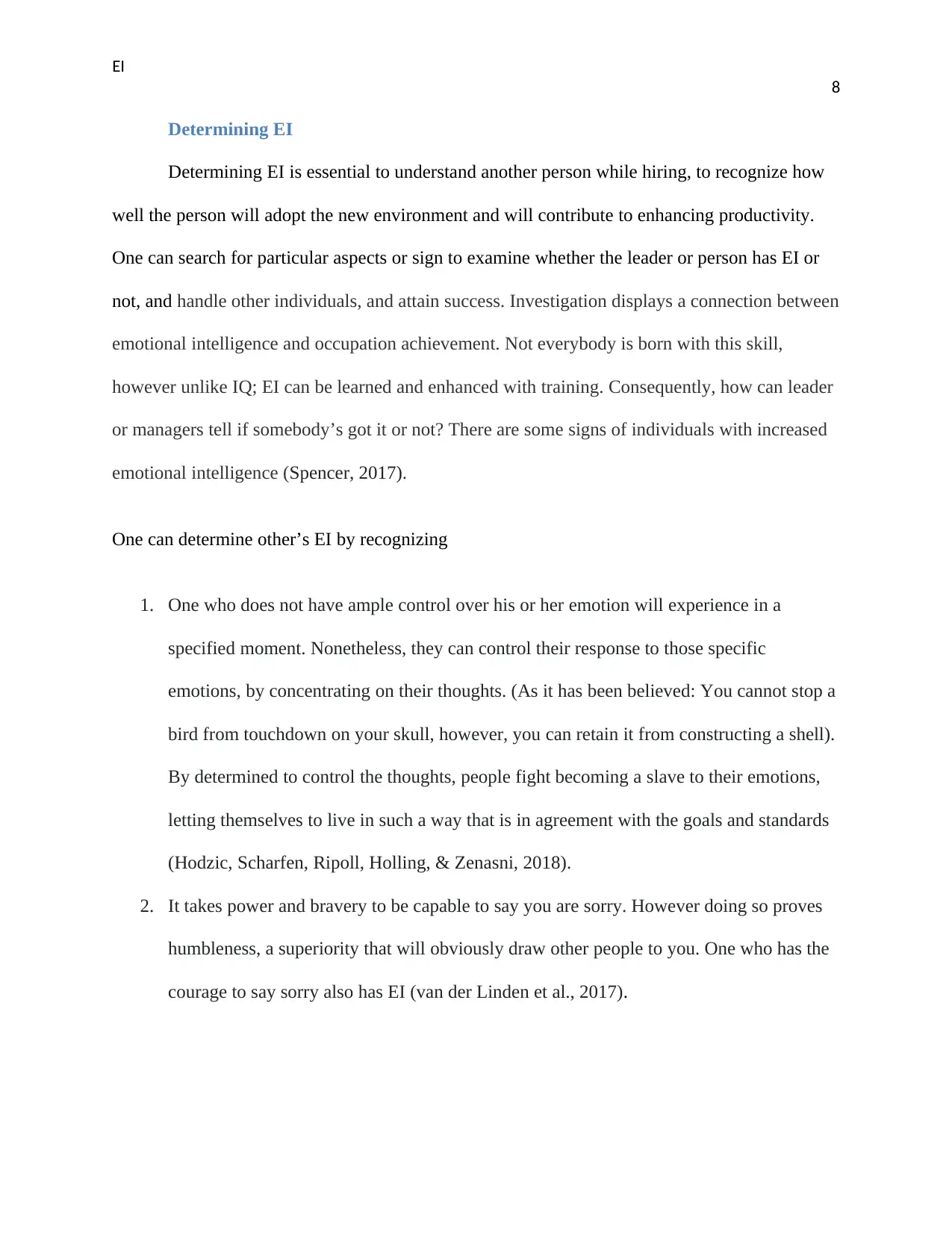
EI
8
Determining EI
Determining EI is essential to understand another person while hiring, to recognize how
well the person will adopt the new environment and will contribute to enhancing productivity.
One can search for particular aspects or sign to examine whether the leader or person has EI or
not, and handle other individuals, and attain success. Investigation displays a connection between
emotional intelligence and occupation achievement. Not everybody is born with this skill,
however unlike IQ; EI can be learned and enhanced with training. Consequently, how can leader
or managers tell if somebody’s got it or not? There are some signs of individuals with increased
emotional intelligence (Spencer, 2017).
One can determine other’s EI by recognizing
1. One who does not have ample control over his or her emotion will experience in a
specified moment. Nonetheless, they can control their response to those specific
emotions, by concentrating on their thoughts. (As it has been believed: You cannot stop a
bird from touchdown on your skull, however, you can retain it from constructing a shell).
By determined to control the thoughts, people fight becoming a slave to their emotions,
letting themselves to live in such a way that is in agreement with the goals and standards
(Hodzic, Scharfen, Ripoll, Holling, & Zenasni, 2018).
2. It takes power and bravery to be capable to say you are sorry. However doing so proves
humbleness, a superiority that will obviously draw other people to you. One who has the
courage to say sorry also has EI (van der Linden et al., 2017).
8
Determining EI
Determining EI is essential to understand another person while hiring, to recognize how
well the person will adopt the new environment and will contribute to enhancing productivity.
One can search for particular aspects or sign to examine whether the leader or person has EI or
not, and handle other individuals, and attain success. Investigation displays a connection between
emotional intelligence and occupation achievement. Not everybody is born with this skill,
however unlike IQ; EI can be learned and enhanced with training. Consequently, how can leader
or managers tell if somebody’s got it or not? There are some signs of individuals with increased
emotional intelligence (Spencer, 2017).
One can determine other’s EI by recognizing
1. One who does not have ample control over his or her emotion will experience in a
specified moment. Nonetheless, they can control their response to those specific
emotions, by concentrating on their thoughts. (As it has been believed: You cannot stop a
bird from touchdown on your skull, however, you can retain it from constructing a shell).
By determined to control the thoughts, people fight becoming a slave to their emotions,
letting themselves to live in such a way that is in agreement with the goals and standards
(Hodzic, Scharfen, Ripoll, Holling, & Zenasni, 2018).
2. It takes power and bravery to be capable to say you are sorry. However doing so proves
humbleness, a superiority that will obviously draw other people to you. One who has the
courage to say sorry also has EI (van der Linden et al., 2017).
⊘ This is a preview!⊘
Do you want full access?
Subscribe today to unlock all pages.

Trusted by 1+ million students worldwide
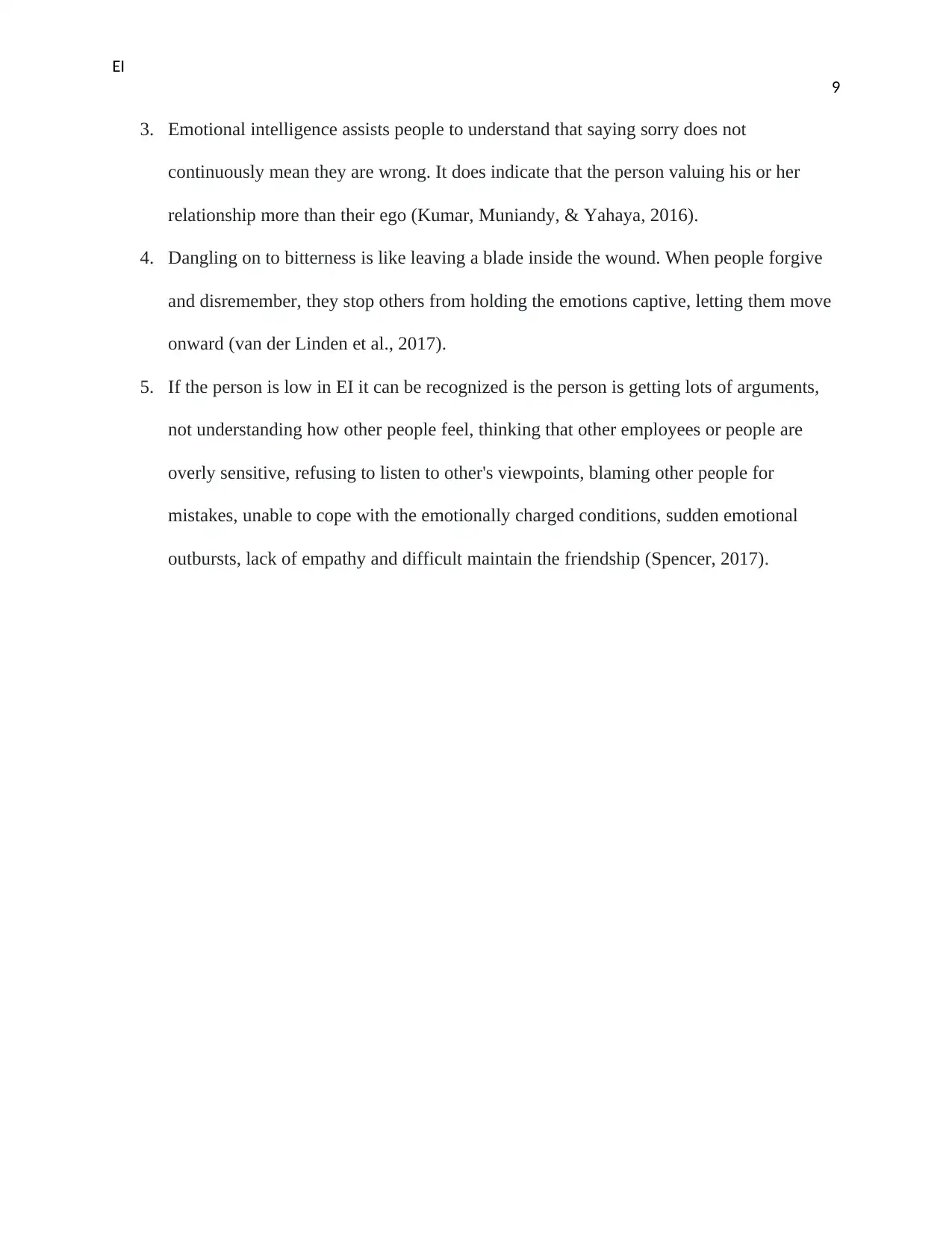
EI
9
3. Emotional intelligence assists people to understand that saying sorry does not
continuously mean they are wrong. It does indicate that the person valuing his or her
relationship more than their ego (Kumar, Muniandy, & Yahaya, 2016).
4. Dangling on to bitterness is like leaving a blade inside the wound. When people forgive
and disremember, they stop others from holding the emotions captive, letting them move
onward (van der Linden et al., 2017).
5. If the person is low in EI it can be recognized is the person is getting lots of arguments,
not understanding how other people feel, thinking that other employees or people are
overly sensitive, refusing to listen to other's viewpoints, blaming other people for
mistakes, unable to cope with the emotionally charged conditions, sudden emotional
outbursts, lack of empathy and difficult maintain the friendship (Spencer, 2017).
9
3. Emotional intelligence assists people to understand that saying sorry does not
continuously mean they are wrong. It does indicate that the person valuing his or her
relationship more than their ego (Kumar, Muniandy, & Yahaya, 2016).
4. Dangling on to bitterness is like leaving a blade inside the wound. When people forgive
and disremember, they stop others from holding the emotions captive, letting them move
onward (van der Linden et al., 2017).
5. If the person is low in EI it can be recognized is the person is getting lots of arguments,
not understanding how other people feel, thinking that other employees or people are
overly sensitive, refusing to listen to other's viewpoints, blaming other people for
mistakes, unable to cope with the emotionally charged conditions, sudden emotional
outbursts, lack of empathy and difficult maintain the friendship (Spencer, 2017).
Paraphrase This Document
Need a fresh take? Get an instant paraphrase of this document with our AI Paraphraser
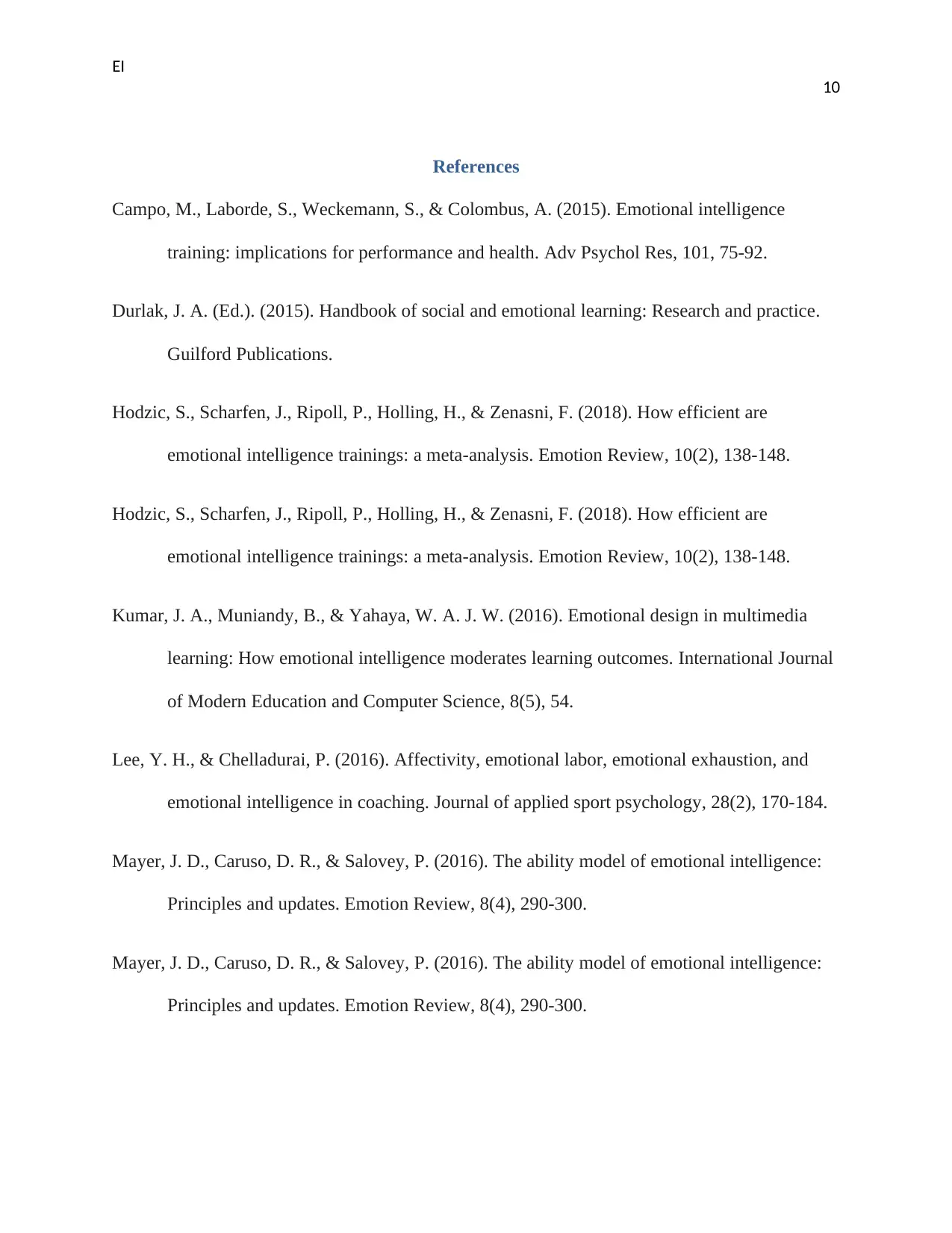
EI
10
References
Campo, M., Laborde, S., Weckemann, S., & Colombus, A. (2015). Emotional intelligence
training: implications for performance and health. Adv Psychol Res, 101, 75-92.
Durlak, J. A. (Ed.). (2015). Handbook of social and emotional learning: Research and practice.
Guilford Publications.
Hodzic, S., Scharfen, J., Ripoll, P., Holling, H., & Zenasni, F. (2018). How efficient are
emotional intelligence trainings: a meta-analysis. Emotion Review, 10(2), 138-148.
Hodzic, S., Scharfen, J., Ripoll, P., Holling, H., & Zenasni, F. (2018). How efficient are
emotional intelligence trainings: a meta-analysis. Emotion Review, 10(2), 138-148.
Kumar, J. A., Muniandy, B., & Yahaya, W. A. J. W. (2016). Emotional design in multimedia
learning: How emotional intelligence moderates learning outcomes. International Journal
of Modern Education and Computer Science, 8(5), 54.
Lee, Y. H., & Chelladurai, P. (2016). Affectivity, emotional labor, emotional exhaustion, and
emotional intelligence in coaching. Journal of applied sport psychology, 28(2), 170-184.
Mayer, J. D., Caruso, D. R., & Salovey, P. (2016). The ability model of emotional intelligence:
Principles and updates. Emotion Review, 8(4), 290-300.
Mayer, J. D., Caruso, D. R., & Salovey, P. (2016). The ability model of emotional intelligence:
Principles and updates. Emotion Review, 8(4), 290-300.
10
References
Campo, M., Laborde, S., Weckemann, S., & Colombus, A. (2015). Emotional intelligence
training: implications for performance and health. Adv Psychol Res, 101, 75-92.
Durlak, J. A. (Ed.). (2015). Handbook of social and emotional learning: Research and practice.
Guilford Publications.
Hodzic, S., Scharfen, J., Ripoll, P., Holling, H., & Zenasni, F. (2018). How efficient are
emotional intelligence trainings: a meta-analysis. Emotion Review, 10(2), 138-148.
Hodzic, S., Scharfen, J., Ripoll, P., Holling, H., & Zenasni, F. (2018). How efficient are
emotional intelligence trainings: a meta-analysis. Emotion Review, 10(2), 138-148.
Kumar, J. A., Muniandy, B., & Yahaya, W. A. J. W. (2016). Emotional design in multimedia
learning: How emotional intelligence moderates learning outcomes. International Journal
of Modern Education and Computer Science, 8(5), 54.
Lee, Y. H., & Chelladurai, P. (2016). Affectivity, emotional labor, emotional exhaustion, and
emotional intelligence in coaching. Journal of applied sport psychology, 28(2), 170-184.
Mayer, J. D., Caruso, D. R., & Salovey, P. (2016). The ability model of emotional intelligence:
Principles and updates. Emotion Review, 8(4), 290-300.
Mayer, J. D., Caruso, D. R., & Salovey, P. (2016). The ability model of emotional intelligence:
Principles and updates. Emotion Review, 8(4), 290-300.
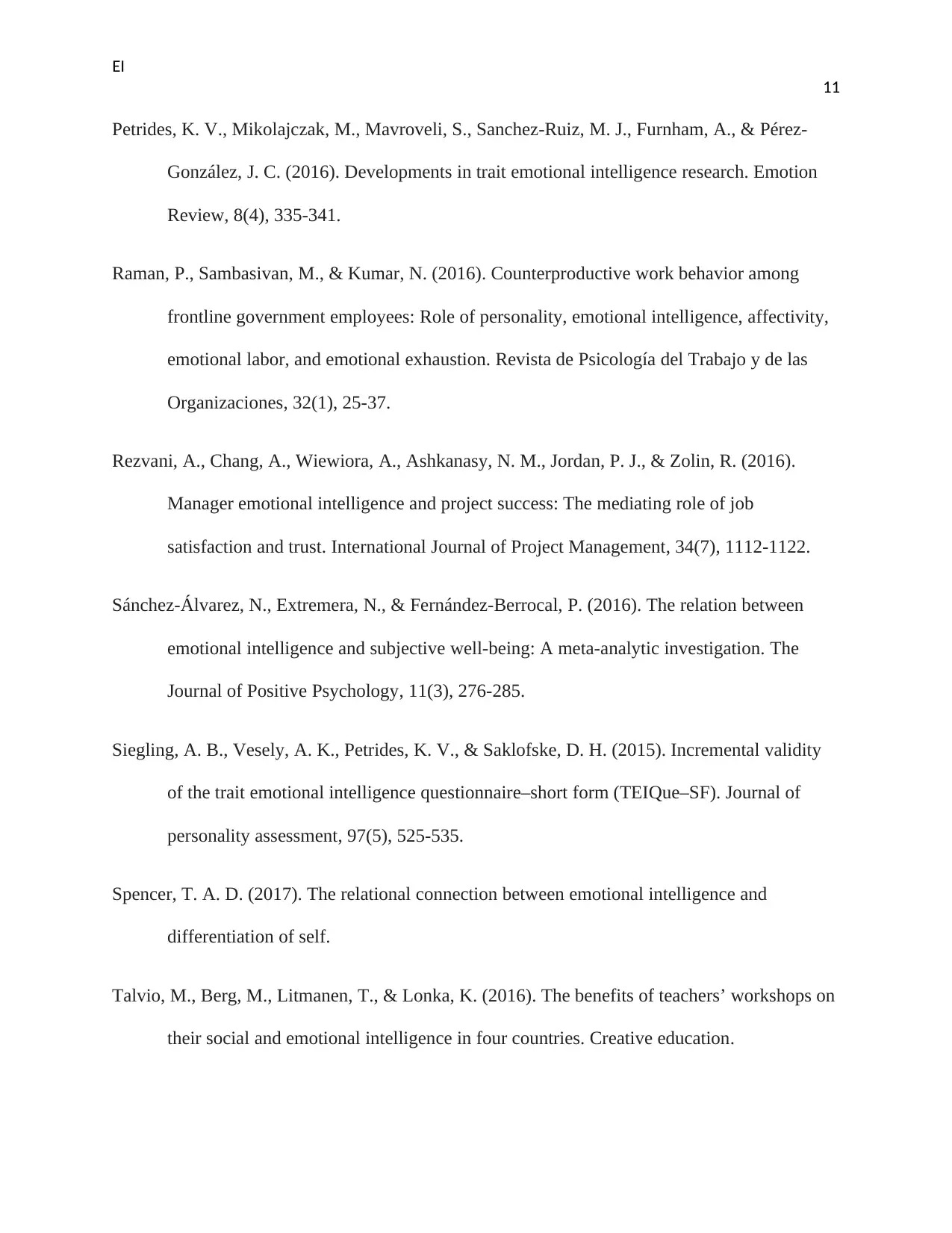
EI
11
Petrides, K. V., Mikolajczak, M., Mavroveli, S., Sanchez-Ruiz, M. J., Furnham, A., & Pérez-
González, J. C. (2016). Developments in trait emotional intelligence research. Emotion
Review, 8(4), 335-341.
Raman, P., Sambasivan, M., & Kumar, N. (2016). Counterproductive work behavior among
frontline government employees: Role of personality, emotional intelligence, affectivity,
emotional labor, and emotional exhaustion. Revista de Psicología del Trabajo y de las
Organizaciones, 32(1), 25-37.
Rezvani, A., Chang, A., Wiewiora, A., Ashkanasy, N. M., Jordan, P. J., & Zolin, R. (2016).
Manager emotional intelligence and project success: The mediating role of job
satisfaction and trust. International Journal of Project Management, 34(7), 1112-1122.
Sánchez-Álvarez, N., Extremera, N., & Fernández-Berrocal, P. (2016). The relation between
emotional intelligence and subjective well-being: A meta-analytic investigation. The
Journal of Positive Psychology, 11(3), 276-285.
Siegling, A. B., Vesely, A. K., Petrides, K. V., & Saklofske, D. H. (2015). Incremental validity
of the trait emotional intelligence questionnaire–short form (TEIQue–SF). Journal of
personality assessment, 97(5), 525-535.
Spencer, T. A. D. (2017). The relational connection between emotional intelligence and
differentiation of self.
Talvio, M., Berg, M., Litmanen, T., & Lonka, K. (2016). The benefits of teachers’ workshops on
their social and emotional intelligence in four countries. Creative education.
11
Petrides, K. V., Mikolajczak, M., Mavroveli, S., Sanchez-Ruiz, M. J., Furnham, A., & Pérez-
González, J. C. (2016). Developments in trait emotional intelligence research. Emotion
Review, 8(4), 335-341.
Raman, P., Sambasivan, M., & Kumar, N. (2016). Counterproductive work behavior among
frontline government employees: Role of personality, emotional intelligence, affectivity,
emotional labor, and emotional exhaustion. Revista de Psicología del Trabajo y de las
Organizaciones, 32(1), 25-37.
Rezvani, A., Chang, A., Wiewiora, A., Ashkanasy, N. M., Jordan, P. J., & Zolin, R. (2016).
Manager emotional intelligence and project success: The mediating role of job
satisfaction and trust. International Journal of Project Management, 34(7), 1112-1122.
Sánchez-Álvarez, N., Extremera, N., & Fernández-Berrocal, P. (2016). The relation between
emotional intelligence and subjective well-being: A meta-analytic investigation. The
Journal of Positive Psychology, 11(3), 276-285.
Siegling, A. B., Vesely, A. K., Petrides, K. V., & Saklofske, D. H. (2015). Incremental validity
of the trait emotional intelligence questionnaire–short form (TEIQue–SF). Journal of
personality assessment, 97(5), 525-535.
Spencer, T. A. D. (2017). The relational connection between emotional intelligence and
differentiation of self.
Talvio, M., Berg, M., Litmanen, T., & Lonka, K. (2016). The benefits of teachers’ workshops on
their social and emotional intelligence in four countries. Creative education.
⊘ This is a preview!⊘
Do you want full access?
Subscribe today to unlock all pages.

Trusted by 1+ million students worldwide
1 out of 13
Related Documents
Your All-in-One AI-Powered Toolkit for Academic Success.
+13062052269
info@desklib.com
Available 24*7 on WhatsApp / Email
![[object Object]](/_next/static/media/star-bottom.7253800d.svg)
Unlock your academic potential
Copyright © 2020–2026 A2Z Services. All Rights Reserved. Developed and managed by ZUCOL.




